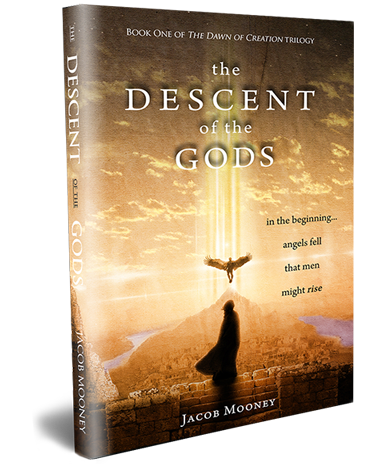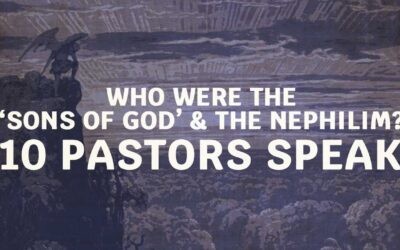In Episode 4 of Faith and Friction, the hosts tackle a subject that has long stirred Christian curiosity and confusion: the Nephilim in Genesis 6.
But in their attempt to bring clarity, they mislead listeners with bold but unsupported claims—asserting, for example, that Jesus quoted the Book of Enoch 11 times, that the United Nations has set up shop on ancient demonic territory, and that angel-human hybrids are part of modern political bloodlines.
These are not harmless oversights. The episode enthusiastically blends myth, apocryphal text, and speculative theology in a way that erodes biblical trust and encourages sensationalism over study.
While the podcast gets some things right (like affirming the angelic interpretation of “sons of God”), it falters by failing to differentiate between useful historical context and divinely inspired Scripture.
Here’s the full episode:
Let’s walk through what was said—and what the Bible and actual scholarship say in response.
What Does Genesis 6 Say?
Genesis 6:1–4 is one of the Bible’s most mysterious texts:
“When man began to multiply… the sons of God saw that the daughters of man were attractive… The Nephilim were on the earth in those days, and also afterward…” (Genesis 6:1–4, ESV)
The passage briefly introduces three figures:
- Sons of God (bene elohim)
- Daughters of men (human women)
- Nephilim (often translated as “giants” or “fallen ones”)
The ancient consensus—reflected in Jewish writings like 1 Enoch, Philo, Josephus, and early church fathers—is that the “sons of God” were angelic beings who crossed a boundary. This is still the majority view among conservative Bible scholars today.
The podcast correctly reflects this interpretation. However, it proceeds to treat the Book of Enoch not merely as context, but nearly as canon.
Did Jesus Allude to the Book of Enoch?
The hosts confidently state:
“Jesus actually alluded to [the Book of Enoch] 11 times.”
This is an extraordinary claim—and it’s given with no citations or explanation. There is no scholarly consensus that Jesus quoted Enoch directly even once, let alone eleven times. However, it is fair to say that many themes found in the Book of Enoch are echoed in Second Temple Jewish thought, and Jesus, being Jewish and operating within that context, sometimes used terms (like “Son of Man”) that appear in Enoch.
That does not mean Jesus was quoting Enoch. More likely, He was referring to concepts common among Jews of His time—concepts that were preserved in Enoch but not sourced from it. This is a subtle but vital distinction.
By stating flatly that “Jesus quoted Enoch 11 times,” the podcast skips over centuries of careful biblical scholarship and bypasses important distinctions in how ancient sources were used. As believers, we should aim to contextualize, not sensationalize.
Is the Book of Enoch Scripture?
This is where the podcast most severely misleads. Let’s examine this in depth.
1. It Is Pseudepigraphal
The Book of Enoch claims to be written by Enoch, the seventh from Adam (Genesis 5:18), but was actually compiled much later—between 300–100 BC. This makes it pseudepigraphal, meaning it was written under a false name. No modern biblical scholar believes Enoch himself wrote it.
2. It Contains Doctrinal Errors
The book is rich in apocalyptic symbolism, but also full of theological and historical inconsistencies. It expands far beyond Genesis 6, adding names of angels, cosmological maps, and end-times visions that don’t align with canonical Scripture. These embellishments, while fascinating, are unreliable as a basis for doctrine.
3. It Was Never Considered Canonical by the Jews or Most of the Early Church
This is important: while early Christians were aware of the Book of Enoch, and a few Church Fathers (like Tertullian) referenced it favorably, the majority did not accept it as Scripture. It was excluded from both Jewish and Christian canons—except in the Ethiopian Orthodox Church.
That said, it’s too strong to claim it was “never accepted.” It’s more accurate to say it was not widely or officially accepted. Some early Jewish groups and Christian writers referenced it—but others avoided it altogether, showing they didn’t view it as authoritative.
4. Jude’s Quotation Doesn’t Make It Scripture
Jude 14–15 quotes 1 Enoch 1:9 almost word for word. But as GotQuestions explains:
“Jude quoting from the Book of Enoch does not indicate the entire Book of Enoch is inspired, or even true.”
Paul also quotes Greek poets in Acts 17 and Titus 1:12. Quoting a source does not mean endorsing all its contents. Jude was inspired to use one true statement Enoch made—not to validate the entire book. It’s best to say that Enoch’s saying survived orally and was included in the book, but Jude quoted the man—not the manuscript.
Debunking the Genetic “Seed War” Theory
The podcast claims in essence that the flood was sent to wipe out the Nephilim, it wasn’t just about sin.
This view reshapes Genesis 6 into a science fiction story about corrupted bloodlines.
But the Bible is clear: “The LORD saw that the wickedness of man was great… I will blot out man…” (Genesis 6:5–7)
While Enoch expands the Nephilim story, Genesis anchors the flood in human sin. The angelic rebellion narrative helps us understand the context—but it’s not the central cause in Scripture.
Even Michael Heiser warns against overstating the Nephilim’s role:
“The real damage of Genesis 6 was the proliferation of human depravity—not the weird Nephilim stuff.”
Mount Hermon, the Watchers, and the UN
The podcast suggests that a UN facility is at the top of modern Mount Hermon – which is true https://undof.unmissions.org/operations. But the podcasters overtly imply that there is a secret connection between modern world powers and ancient fallen angels. This speculation is presented without evidence and is built entirely on one claim in Enoch—that 200 angels descended on Mount Hermon.
But this raises a serious question: Why are we treating a pseudepigraphal source as historically reliable? To accept Enoch’s version of the Mount Hermon event as fact while also layering modern conspiracies on top of it is highly irresponsible.
The border region of Mount Hermon is geopolitically significant—yes—but we cannot responsibly draw conclusions based on coincidences and suggestive language. As Christians, we are called to be discerning, not accusatory without basis.
Are Demons the Spirits of Nephilim?
The podcast presents the idea that demons are the disembodied spirits of dead Nephilim. This is taken directly from 1 Enoch 15:8–10.
While this was a fairly common Jewish belief in the Second Temple period, it is never stated in Scripture. The Bible refers to demons but gives no specific origin story for them. This theory raises theological questions about hybrid souls and the afterlife that Scripture does not answer.
Most conservative scholars recommend treating this theory as interesting but speculative, not doctrine. It may reflect ancient beliefs, but it’s not a binding truth.
Verdict: We Should Value Truth Over Hype
Genesis 6 is strange enough on its own. But when we elevate extra-biblical books to the level of Scripture, or rely on half-stated theories without proper context, we do more harm than good.
Faith and Friction rightly reminds us that there’s more to the Bible than many pastors teach. Yes that’s true and we applaud them for that! But they also model what not to do: make dramatic statements without support, lean on non-canonical sources without qualification, and encourage speculation instead of grounded study.
We must be better stewards of God’s Word. We must ask good questions—and give careful answers.
At Chasing the Giants, we pursue that goal. Join us as we continue to research, clarify, and confront these topics—grounded not in fear or fiction, but in the trustworthy Word of God.
Coming Soon: The Descent of the Gods
A biblically grounded retelling of the angelic rebellion, the Nephilim, and the battle for the soul of humanity.
📬 Join the waitlist today.





